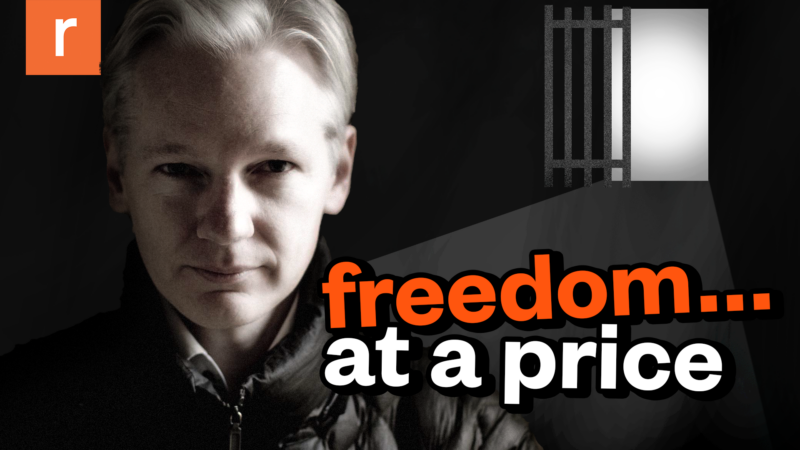
At last, WikiLeaks founder Julian Assange is a free man. Why was he ever locked up in the first place?
Before the Justice Department dropped its request for Assange to be extradited to the U.S. to stand trial, he had to plead guilty to violating the Espionage Act. That cleared the way for Assange to walk out of the maximum-security prison in London where he was being held. But it also sets a legal precedent that threatens free speech and journalism worldwide. Assange isn't a spy. He's a publisher, guilty of embarrassing the U.S. government.
"Really anybody who is concerned about press freedom should be deeply concerned about the prosecution of Julian Assange," says Trevor Timm, co-founder of the Freedom of the Press Foundation. "Maybe [some] journalists don't like Julian Assange, or they have criticized one or many of his actions over the years. That's all well and good, but what really matters are the acts the Justice Department is trying to criminalize here."
WikiLeaks first grabbed public attention with the 2010 release of a video titled "Collateral Murder." It showed footage from a 2007 attack by soldiers in a U.S. Army Apache helicopter, who gunned down more than a dozen people in Baghdad who weren't engaged in active combat, including two Reuters reporters.
The video generated international press and controversy. Assange said his intention was to expose "the 'another day at the office' [attitude of the soldiers], how routine it was."
The release of the Iraq War logs that followed was the largest military leak in history, revealing that more than 15,000 civilian deaths hadn't been publicly reported. And it exposed that the U.S. military had ignored reports of torture, rape, and murder by Iraqi authorities and soldiers.
For years, Assange's critics have attacked him for supposedly meddling in the 2016 election by publishing internal Democratic National Committee emails. They've accused him of sexual assault in Sweden. And he's been vilified for hosting a show on Russian state television.
But none of that is why the Justice Department prosecuted him. They prosecuted him because he published the details of U.S. military misadventures in the Middle East for the world to see. And that's not a crime.
Timm says that a journalist like Bob Woodward, who's made a career publishing government secrets, would be endangered by such a precedent, pointing to Woodward's 2011 book Obama's Wars as an example. "[That book] is page after page of highly classified information…basically the most sensitive information that you could possibly imagine at a far higher classification level than anything WikiLeaks published."
Even the Watergate stories that Woodward published for The Washington Post with Carl Bernstein might be illegal if the Assange standard were applied, argues Timm, because Woodward and Bernstein sought out secret information from grand jurors during their reporting.
"Richard Nixon may never have had to resign," says Timm. "And [Woodward and Bernstein] quite possibly could have gone to jail."
Assange's confinement destroyed his mental and physical health. He was subjected to "psychological torture," according to the United Nations special rapporteur. That cruelty was the price of exposing information that the U.S. government wanted to keep secret. In 2018, Assange's doctors asked that he be hospitalized based on his deteriorating health, and officials denied that request.
"His physical state has obviously deteriorated over that time," Assange's wife Stella Assange told Reason in an interview late last year. "He spends a lot of time in his cell, but he is able to receive visits. So once or twice a week I can go and see him on weekends. I can bring the kids, and that obviously helps him a lot…And that obviously keeps him sane and helps us both feel like we're not so separated and apart."
Assange says his guiding principle has been to grant regular citizens access to the information powerful governments, corporations, and media gatekeepers wanted to keep hidden.
"Someone's right to speak and someone's right to know create a right to communicate," Assange told Democracy Now journalist Amy Goodman at the Frontline Club in July 2011. "That is the grounding structure for all that we treasure about civilized life."
That's Julian Assange's legacy. He showed how hard, even futile, it is to conceal highly sought information in the digital age.
One person, heading a tiny organization, exposed the secrets of the world's most powerful superstate. The American security state may have won an unsettling legal victory in exchange for Assange's freedom, but it's powerless to restrain the anarchic, cypherpunk future of digital information sharing that he unleashed.
- Graphics: Lex Villena
- Video Editor: Adani Samat
The post Julian Assange's Freedom Came at a Steep Price appeared first on Reason.com.







